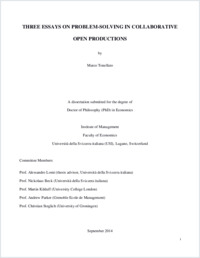Three essays on problem-solving in collaborative open productions
- Tonellato, Marco
- Lomi, Alessandro (Degree supervisor)
-
05.09.2014
161 p
Thèse de doctorat: Università della Svizzera italiana, 2014
Organization theory
Open innovation
Open source software
Organizational learning
Social network analysis
Problem solving
Decision making
English
The term “open production” is frequently used to describe production systems that rely on volunteer participants who are willing to participate, produce, and bear private costs in order to provide a public good. Examples of open production are becoming increasingly common in many industries. What make these productions possible? How may they be sustained in a world of organizations in which the evolutionary products of economic selection are elaborate hierarchical forms of organization? One way to address these questions is to look at how open productions solve problems that are common to all production organizations such as, for example, problems in the division of labor, allocation of tasks, collaboration, coordination, and maintaining balance between inducement and contributions. Under the conditions of extreme decentralization that are the defining feature of open productions, this approach implies a detailed observation of individual problem solving practices. This is the approach I develop in my dissertation. Unlike much of the prior literature on open productions, I deemphasize motivational elements, status-seeking motives, and allocation of property rights issues. I focus instead on actual work practices as revealed by the day-by-day problem solving activities that qualify open productions projects as production organizations despite the absence of formal contractual arrangements to regulate principal-agent relations. What my work adds to the extensive, informative, and well-developed discipline-based explanations that are currently available, is a focus on the emergence of micro-organizational mechanisms through which problem assignment (Chapter 2), problem resolution (Chapter 3), and sustained participation (Chapter 4) are obtained in open productions. In my essays, I draw from organizational sociology and the behavioral theory of the firm to specify models that relate individual problem-solving activities to structured patterns of action through emergent work practices. In the models that I specify and test, I emphasize processes of attention allocation (Chapter 2), repeated collaboration and group diversity (Chapter 3) and identity construction (Chapter 4) as central to our understanding of the dynamics of problem-solving in organizations. One element of novelty in my study is that my research design makes these work practices directly observable at a level of detail, completeness, and precision that was inaccessible in the past. To illustrate the empirical value of the view that I develop I examine problem-solving activities – i.e., bug fixing and code production – within two Free/Open Source Software (F/OSS) projects during their entire life span. Readers of my work will know more about how organizational micro-mechanisms emerge in open productions.
- Language
-
- English
- Classification
- Economics
- License
- License undefined
- Identifiers
-
- RERO DOC 233382
- URN urn:nbn:ch:rero-006-113602
- ARK ark:/12658/srd1318386
- Persistent URL
- https://n2t.net/ark:/12658/srd1318386
Statistics
Document views: 122
File downloads:
- 2014ECO010.pdf: 60
